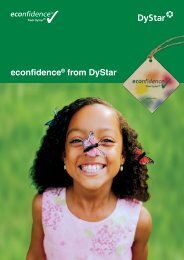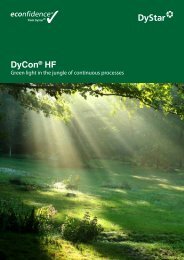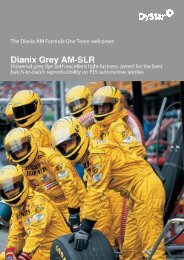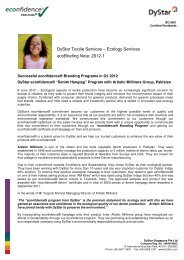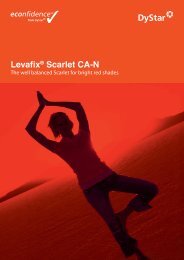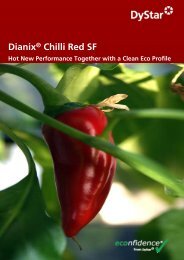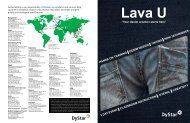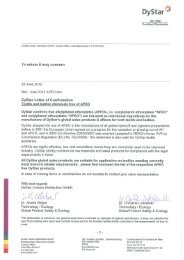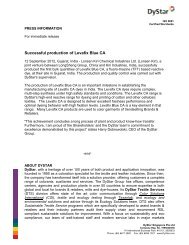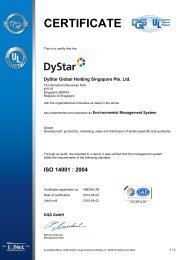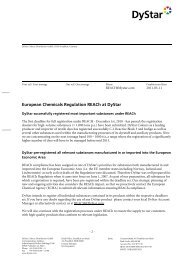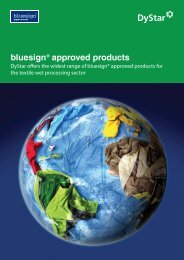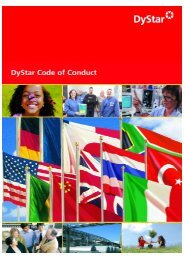Read the DyStar Sustainability Report 2011...
Read the DyStar Sustainability Report 2011...
Read the DyStar Sustainability Report 2011...
Create successful ePaper yourself
Turn your PDF publications into a flip-book with our unique Google optimized e-Paper software.
Society<br />
<strong>DyStar</strong> is committed to being a good corporate citizen by contributing<br />
to community development in a meaningful way. Technical knowledge<br />
and expertise in <strong>the</strong> area of textile chemicals is our key strength. We<br />
believe we can use our core strength to make a difference in society.<br />
This is why <strong>DyStar</strong> has identified technical education as a key area of<br />
community investment.<br />
Investing in promoting technical education enables <strong>the</strong> beneficiaries<br />
to gain knowledge and skills that are in demand. The textile industry<br />
on <strong>the</strong> o<strong>the</strong>r hand gains from availability of trained manpower.<br />
One of <strong>the</strong> first initiatives we started was in India where we collaborated<br />
with industry partners to open an academy in 2010.<br />
Academy for developing textile technologists in India<br />
In India, <strong>the</strong> industry faces shortage of textile technologists with <strong>the</strong><br />
right skills. A key reason is that curriculum in several textile technology<br />
schools has not been able to keep pace with rapid development of<br />
new technology in <strong>the</strong> textile sector.<br />
To address <strong>the</strong> issue, <strong>DyStar</strong> and India’s largest fully integrated textile<br />
company Alok Industries Limited have joined hands to set up a not-<br />
for-profit academy in India to identify, train and retain talent within<br />
<strong>the</strong> industry.<br />
The Advanced Academy for Development of Textile Technologists<br />
(AADTT), as <strong>the</strong> institute is called, has been established as a charitable<br />
trust.<br />
AADTT has signed memorandum of understanding (MOU) with more<br />
than ten premium institutes across <strong>the</strong> country, <strong>the</strong> Society of Dyers<br />
and Colorists (SDC), American Association of Textile Chemist and Colorist<br />
(AATCC), ASTM and o<strong>the</strong>rs to back <strong>the</strong> initiative.<br />
AADTT’s vision is to create a unique knowledge and technologically<br />
advanced platform for identification, skill enhancement and career<br />
development of resources especially for <strong>the</strong> textile industry.<br />
AADTT recruits B.Tech and M.Tech students from across <strong>the</strong> country,<br />
offers <strong>the</strong>m accommodation, transport, stipend and trains <strong>the</strong>m for<br />
a period of one year in <strong>DyStar</strong> and Alok facilities by carefully selected<br />
internal and external faculty members. The academy provides<br />
quality training, practical knowledge, innovative technology, skills of<br />
entrepreneurship and leadership.<br />
Interested textile industry companies can hire <strong>the</strong>se students after<br />
<strong>the</strong>y complete <strong>the</strong> training. Equipped with <strong>the</strong> latest practical knowledge<br />
and skills, <strong>the</strong> academy’s students can look forward to relatively higher<br />
remuneration package.<br />
Collaboration with <strong>the</strong> American Association of Textile Chemists and<br />
Colorists (AATCC) has enabled <strong>the</strong> academy to include AATCC’s<br />
internationally accepted standards of textile testing in <strong>the</strong> syllabus.<br />
Students get to learn standard methods of testing dyed and chemically<br />
treated fibers and fabrics to measure and evaluate such performance<br />
characteristics as color fastness to light and washing, durable press,<br />
soil release, shrinkage, water resistance and <strong>the</strong> many o<strong>the</strong>r conditions<br />
to which textiles may be subjected.<br />
2011 <strong>Sustainability</strong> <strong>Report</strong> - <strong>DyStar</strong> Group 55



